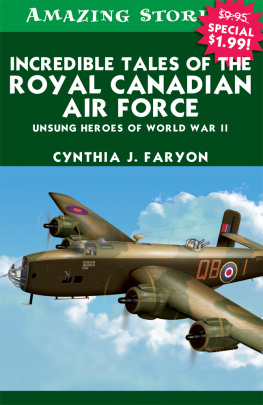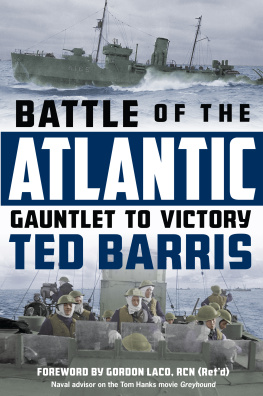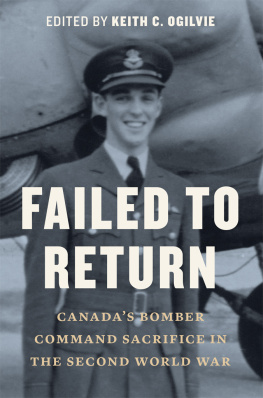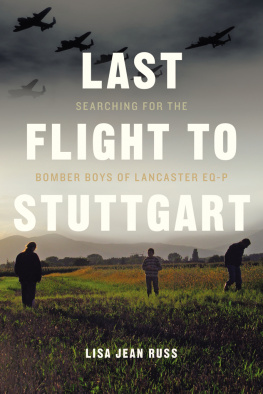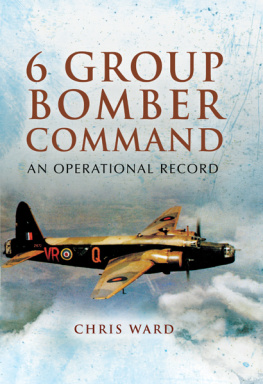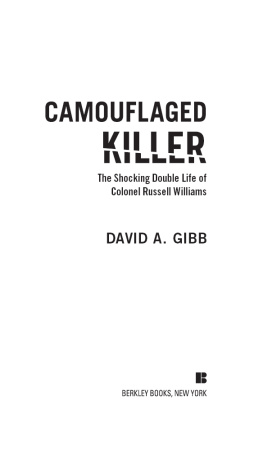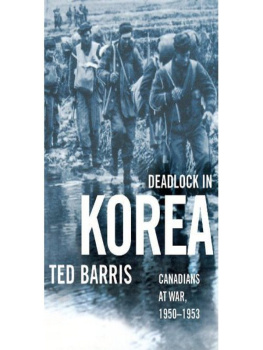To my grandchildren: Rebecca, Brandon, Courtenay, Alex, Jacob, and Owen, so they, too, will remember
Prologue Silent Hero
As I sat fidgeting in a church pew on Sunday, November 11, 1984, I glanced curiously at the Legion uniforms around me. So many old geezers, I thought irreverently. Then I turned my attention to our minister, who was introducing our guest speaker in honour of Remembrance Day; it was a morning I will never forget.
Larry, a tall man in his 60s, came forward and shook the ministers hand. Taking his place at the podium, he began to address the congregation in a quiet voice. Although he appeared calm, his eyes shifted nervously over his audience, betraying his inner feelings. He told us how, as the oldest son of a northern Saskatchewan farmer, he had eagerly signed up with the Royal Canadian Air Force (RCAF) in June of 1941. After training in Brandon, Manitoba, he shipped out to England to fly with the Royal Air Force (RAF), along with many other Canadians. Due to keen marksmanship, Larry had been assigned to No. 77 Squadron as a rear gunner.
I found myself chuckling, along with the rest of the congregation, as Larry described the awkwardness of folding his tall frame into the tiny compartment that housed the rear guns on the Halifax bombers. Quietly, almost as an afterthought, he also stated that the life expectancy of a rear gunner during World War II was approximately five weeks. Yet, I knew from the introduction he had received from our minister that this brave man had flown 38 missions over three years.
In a voice punctuated with di ffi cult emotions, he described his horror as another bomber in his squad was fatally hit by anti-aircraft artillery while flying a bombing mission over Germany. He recounted his desperate prayers that the pilot dump his load early, giving the plane a chance to limp back and bring the crew home safely. However, that day, Larry witnessed true heroism. The ill-fated bomber doggedly smoked its way to the designated bombing site and dropped its load on the target as planned, instead of on some unsuspecting civilian family. Larry and the rest of his crew watched helplessly; the plane disintegrated as the crew jumped from the wounded guts of the bomber some with parachutes, some without. Larry watched in horror as enemy fighters gunned those suspended helplessly by their parachutes before they disappeared into the unknown.
Larry paused, reaching down to grasp a glass of water in his shaking hand. I noted the deafening silence of the congregation around me. Those in uniform sat in stony remembrance, while those of us born free of the horrors of war wrestled with the inherited memories of what this man had survived. I looked with compassion at Larry, disturbed to his soul by the horrors of war, and began to understand.
Clearing his throat, Larry smiled apologetically before he continued. He then described a daylight mission he had flown that had brought him face to face with his own mortality. The purpose of each mission was to hit a predetermined target, he explained, some obscure point on a map. Larry, like many others on these assignments, tried not to think of the people this target represented. For, although he was fifth-generation Canadian, he was of Dutch-German descent. He tried not to wonder if he was bombing a cousin or if a relative was flying raids over London.
During this mission, German fighters attacked the bombers. Larry saw a Messerschmitt closing in fast. As the rear guns were the first targets when attacking a bomber, the German fighter had him in his sights. Larrys guns jammed, so he couldnt swing around to defend himself or his crew. Thinking it was all over, he stared in mortal fascination as death screamed at him in slow motion. He looked into the cockpit of the enemy plane, right into the eyes of the German pilot, and waited for the inevitable blast from the guns. The pilot seemed to hesitate as he looked back into Larrys eyes. The enemy lifted his hand in a half salute and was gone without firing a shot. Larry paused. Then he quietly said that he would like to meet that man someday. He would like to thank him for sparing his life, and the lives of his two sons, three daughters, and fourteen grandchildren.
Glancing at the medals he wore on his chest I recognized the prestigious Distinguished Flying Cross (DFC) and waited eagerly to hear how hed earned it. I was to be disappointed. Larry never related his own acts of heroism. Instead, he spoke of the look of death he had seen on the faces of some flyers before each mission. He spoke of the unmistakable aura around those who would not make it back and the ultimate despair the survivors felt when the mission was complete and those marked had been lost behind enemy lines. He spoke of all who died as personal heroes, and I sensed he wasnt the only mourner present.
As I listened, my respect grew for the experiences of the proud people in uniforms, and I reflected on how my own life had been marked and shaped by the bravery performed while our world was at war. I thought of my fathers active service: my childhood frustration of not being allowed to chew gum, or crunch potato chips or raw vegetables around him. My mother always explained it was due to the shell shock my dad had suffered during the war, but being a child I hadnt understood. I also remembered that my dad would have nightmares after watching a war movie before going to bed. I remembered with compassion the time my father had made a hasty retreat during a fireworks display. I can still see him wearing a haunted expression, pacing and chain-smoking. Id known that all these episodes were the result of his wartime experiences, but Id only understood it on the most superficial level.
In all the years I was growing up, I never heard my father talk about the war; not of any of his missions nor of his friends who had died. He kept his medals tucked away in a drawer, along with a picture of his squadron, marks drawn under all those whod been killed in action. He chose to wear his scars silently; the scars that had helped shape my childhood. During that unforgettable Remembrance Day service on November 11, 1984, I listened as my father, Larry, chose to break his silence I finally understood.

